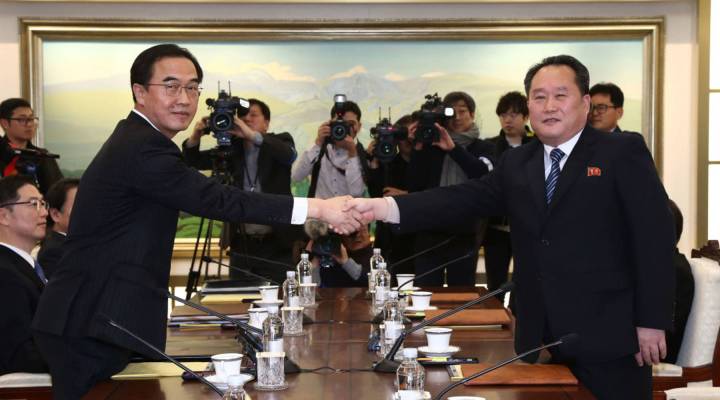
How North Korea going to the Olympics could affect sanctions
How North Korea going to the Olympics could affect sanctions

After the first formal talks between North and South Korea in just over two years, the forthcoming Winter Olympic Games have become the catalyst for some easing of tensions. South Korean Vice Unification Minister Chun Hae-sung told reporters today that the North Korean delegation said it would send an Olympic delegation, including officials, athletes, and cheerleaders, according to the Associated Press.
Marketplace Morning Report host David Brancaccio spoke with the BBC’s Hyung Kim, who is in Seoul, about how this will affect economic sanctions that are in place against North Korea. Below is an edited transcript of their conversation.
David Brancaccio: Give us a sense of which sanctions would have to be modified or lifted temporarily to allow this Olympic interaction to occur.
Hyung Kim: First of all, it depends on how the delegation would be coming to Pyeongchang. If they come by flights that means they might use [North Korea’s Air Koryo airlines] and [Air Koryo] is on sanctions list … What I mean by sanction is South Korea’s unilateral financial sanctions. However, if they come by bus or by land, which seems very likely at this point, that may not be the issue. And also if the delegation includes some of the figures that are on sanctions list, that sanction may have to be relieved as well.
Brancaccio: Now can the South Koreans and the North Koreans just work this out amongst themselves or do you think the United Nations might have to get involved in some of the details here?
Kim: These sanctions is the unilateral sanctions of the South Korean government. So technically South Korean can relieve these sanctions on their own. However, these sanctions movement is an international movement, international pressure led by the U.S. so South Korea probably will have to talk to the U.S. Actually, South Korean president has been saying repeatedly that South Korea will consult with the United States throughout these talks so they will very likely talk to each other about it.
Brancaccio: What’s your impression about individuals, officials from North Korea who might want to come to the Olympics? Might certain names have to be added to the list because at the moment they’re prohibited from visiting?
Kim: Well the North Korean officials that were at Panmunjom today have repeatedly said that they will send high-ranking officials, high-level officials and it’s very likely that since the participation in Pyeongchang was something that the leader Kim Jong Un brought up in his New Year’s message. It’s very likely that some of his key confidants will come to Pyeongchang.
Brancaccio: And the North Koreans want to send some athletes and cheerleaders.
Kim: Definitely, but that wasn’t a surprising thing. Cheerleading squad performance team — that was expected. And taekwondo demonstration team — somewhat expected. However, what was not expected is what they call a spectator group or audience group. [A South Korean] unification vice minister in Seoul actually told reporters that they are not 100 percent sure what the North means by “spectator groups” since they have not sent this kind of group before but it could consist of high-level, high-ranking officials in the North.
Brancaccio: So interesting. And probably an unanswerable question at this point and probably the most important question is, “Is this a prelude to further talks and some kind of easing of tensions?” Is there any way to answer that at this point?
Kim: Well, that’s exactly what the South wants, that this could be a beginning of something — something bigger, something other than sports. And one indication is that so many people are paying attention [to] whether or not Seoul officials would be able to bring up the issue of nuclear or even mention the word “nuclear.” But apparently they did, according to the Unification Ministry. Unification minister who led the delegation said that there has to be peace or there has to be an end to the tension on the Korean Peninsula and in order for that to happen, talks should happen including talks for denuclearization. So he did mention the word “denuclearization.” However, the Unification Ministry said that the North responded by listening carefully without immediate response. So it’s uncertain. North Korea has always been unpredictable in many ways.
| 4 things you didn’t know about North Korea’s economy |
| The diplomatic approach to North Korea is a long game |
There’s a lot happening in the world. Through it all, Marketplace is here for you.
You rely on Marketplace to break down the world’s events and tell you how it affects you in a fact-based, approachable way. We rely on your financial support to keep making that possible.
Your donation today powers the independent journalism that you rely on. For just $5/month, you can help sustain Marketplace so we can keep reporting on the things that matter to you.












